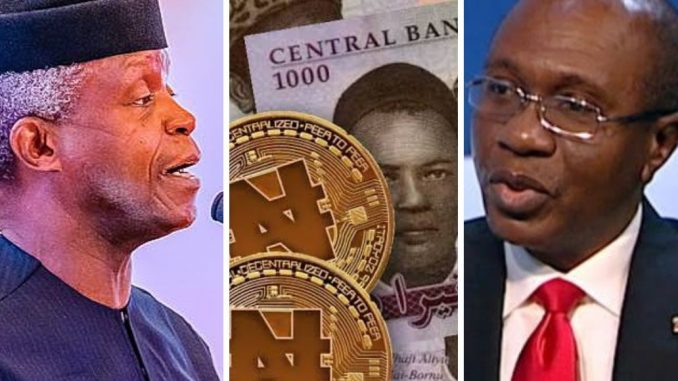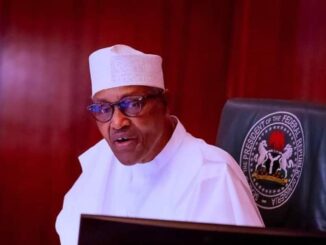
The February 26, 2021 intervention of Vice President Yemi Osinbajo on the row created with the ban of cryptocurrency in Nigeria, by the apex bank is yielding results with the resolve of the Central Bank of Nigeria (CBN) to launch its own digital currency.
The CBN, had, on Thursday, disclosed that it will launch a pilot scheme of its own digital currency by October 1, 2021.
This resolution made during a private webinar on Thursday where the CBN and its stakeholders outlined a digital currency initiative, corroborated the announcement earlier made in June by the apex bank to launch its own digital currency before the close of the year.
The CBN said about 80 per cent of central banks globally are currently exploring the possibility of issuing their Central Bank Digital Currency (CBDC) and Nigeria could not be left behind.
Rakiya Mohammed, who is CBN Director of Information Technology, explaining the decision reached at the end of the stakeholders meeting, said, the apex bank had been conducting research since 2017 in regards to developing a digital currency.
She further disclosed that CBN may conduct a proof of concept before the end of this year, adding that, the project name is tagged ‘GIANT’ and aimed to use the Hyperledger Fabric blockchain.
The Hyperledger Fabric is an open source project that acts as a foundation for developing blockchain-based products, solutions, and applications using plug-and-play components that are aimed for use within private enterprises.
Stating the importance of its digital currency, the CBN said this will include macro management and growth, cross border trade facilitation, financial inclusion, monetary policy effectiveness, improved payment efficiency, revenue tax collection, remittance improvement, and targeted social intervention.
As it stands, Nigeria will join other countries across the globe and Africa racing to develop its CBDC, if the CBN pilot scheme is eventually launched.
ALSO READ: Nigeria: Osinbajo redes CBN on cryptocurrency prohibition, calls for robust regulation
Such countries developing its CBDC include South Africa (digital Rand), Tunisia (eDinar), Ghana (e-cedi), Russia, Sweden, Japan and South Korea
Among a few countries that have officially launched their own national digital currency include, China (digital yuan), Bahamas (sand dollar) and Eastern Caribbean (DCash).
Recalled that earlier in the year, as the CBN banned cryptocurrency transactions in Nigeria, it warned that cryptocurrencies posed the risk of loss of investments, money laundering, terrorism financing, illicit fund flows and other criminal activities.
But the Vice President, Prof Osinbajo, had called for the regulation of cryptocurrency transactions in Nigeria rather than an outright ban.
Prof Osinbajo made the remark while delivering a keynote address at the CBN Bankers Committee Economic Summit held virtually on Friday, February 26, 2021.
In a statement issued by Laolu Akande, the Vice President’s spokesperson, he quoted Prof Osinbajo as saying: “Rather than adopt a policy that prohibits cryptocurrency operations in the Nigerian banking sector, we must act with knowledge and not fear and develop a robust regulatory regime that is thoughtful and knowledge-based.”
Also, while emphasising the need for monetary authorities to rethink their stand on cryptocurrency, the Vice President said “there is no question that blockchain technology generally and cryptocurrencies, in particular, will in the coming years challenge traditional banking, including reserve (Central) banking, in ways that we cannot yet imagine.”
“So, we need to be prepared for that seismic shift. And it may come sooner than later,” Prof Osinbajo added.
The Vice President’s comments came about three weeks after the CBN on February 5, directed all financial institutions in the country to close all cryptocurrency-related accounts and transactions.
The ban sparked controversies amidst concerns over its effect on fintechs, and the rising potential for the Nigerian economy being the world’s second-biggest user of virtual currencies.
Days after, the Securities and Exchange Commission said it had also suspended the approval of cryptocurrency and related products.
But the Vice President noted that already remittance systems are being challenged and that blockchain technology will provide far cheaper options to the kind of fees being paid today for cross-border transfers.
“I am sure you are all aware of the challenge that the traditional SWIFT system is facing from new systems like Ripple which is based on the blockchain distributed ledger technology with its own crypto tokens,” Prof Osinbajo said.
He contended that, there are, of course, a whole range of digital assets spawned daily from block-chain technology and that decentralised finance, using smart contracts to create financial instruments, in place of central financial intermediaries such as banks or brokerages, is set to challenge traditional finance.
The likes of Nexo finance offer instant loans using cryptocurrency as collateral. Some reserve banks are investigating issuing their own digital currencies, the Vice President said, while noting that Nigeria must ensure that it is in a position to benefit and prevent any adverse side effects or evil criminal acts that may arise as a consequence of adopting or taking any of these options.
“There is a role for regulation here, and it is in the place of both our monetary authorities and SEC to provide a robust regulatory regime that addresses these serious concerns without killing the goose that might lay the golden eggs,” the Vice President said.




